Business Research Methodology: Career Progression & Satisfaction
VerifiedAdded on 2020/04/13
|24
|6385
|52
Report
AI Summary
This report presents a comprehensive literature review examining the impact of career progression on employee satisfaction within the hospitality industry, specifically focusing on the food and beverage (F&B) department. It identifies the problem of employee satisfaction as crucial for the industry's success, given the significant role of employees in guest interactions and building goodwill. The report defines career progression as an independent variable and employee satisfaction as a dependent variable, supported by various theories and journal articles. The study explores the interrelationship between these two variables, highlighting the importance of career advancement opportunities for employee motivation and retention. It also discusses relevant theories like Holland's Theory of Vocational Choice, providing a framework for understanding career choices and their impact on job satisfaction. The report further outlines research methods, methodology, data collection, analysis, ethical considerations, and limitations, offering a complete overview of the study's approach and findings.
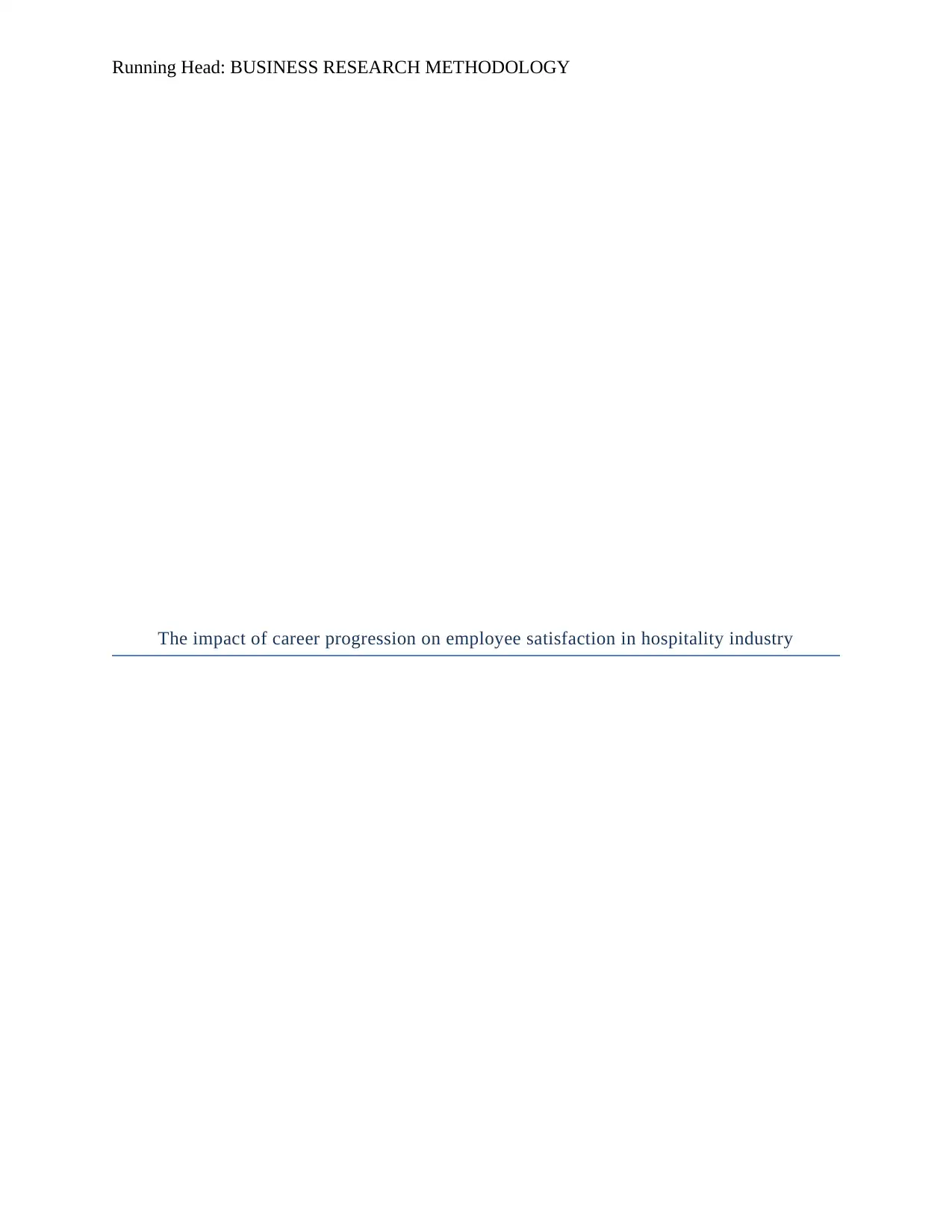
Running Head: BUSINESS RESEARCH METHODOLOGY
The impact of career progression on employee satisfaction in hospitality industry
The impact of career progression on employee satisfaction in hospitality industry
Paraphrase This Document
Need a fresh take? Get an instant paraphrase of this document with our AI Paraphraser
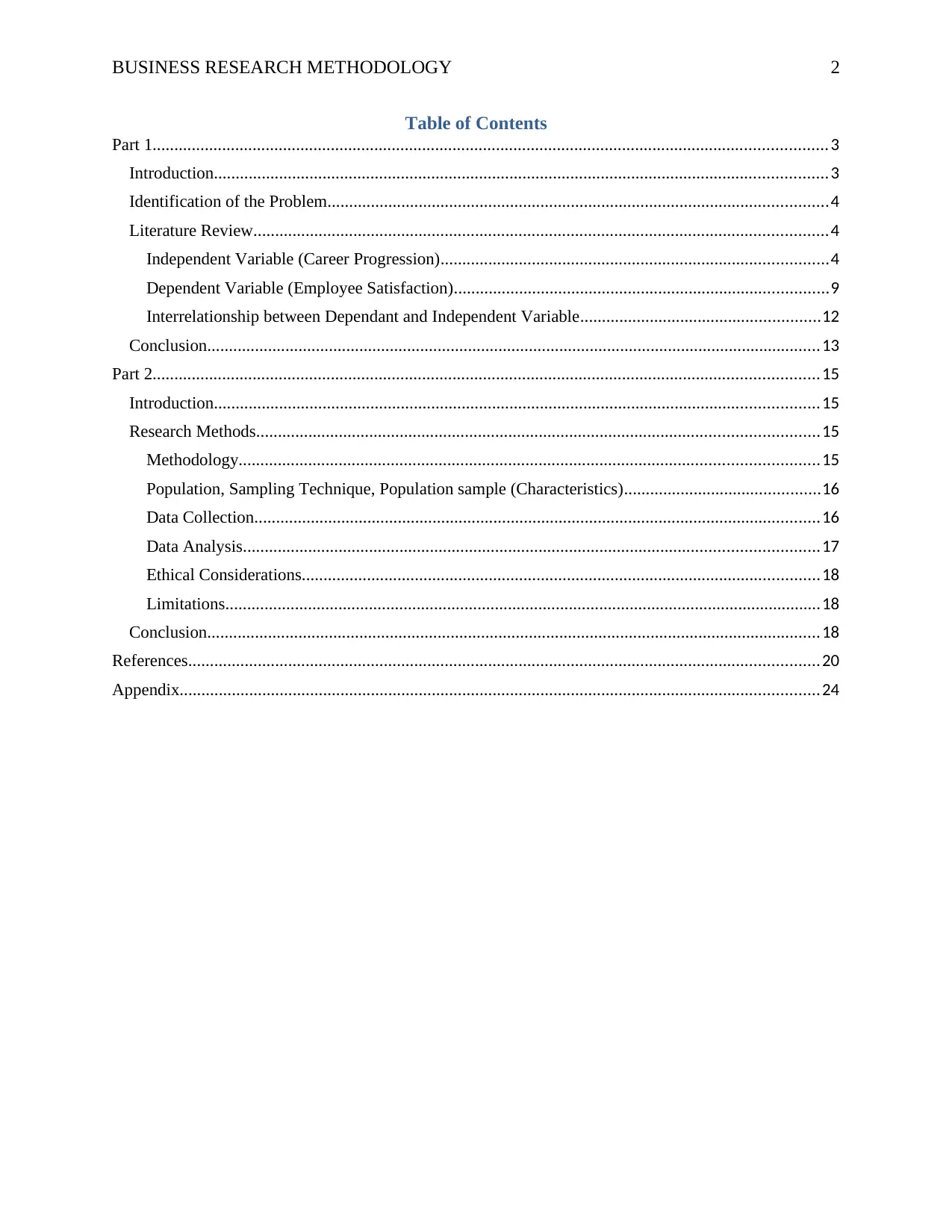
BUSINESS RESEARCH METHODOLOGY 2
Table of Contents
Part 1...........................................................................................................................................................3
Introduction.............................................................................................................................................3
Identification of the Problem...................................................................................................................4
Literature Review....................................................................................................................................4
Independent Variable (Career Progression).........................................................................................4
Dependent Variable (Employee Satisfaction)......................................................................................9
Interrelationship between Dependant and Independent Variable.......................................................12
Conclusion.............................................................................................................................................13
Part 2.........................................................................................................................................................15
Introduction...........................................................................................................................................15
Research Methods.................................................................................................................................15
Methodology.....................................................................................................................................15
Population, Sampling Technique, Population sample (Characteristics).............................................16
Data Collection..................................................................................................................................16
Data Analysis....................................................................................................................................17
Ethical Considerations.......................................................................................................................18
Limitations.........................................................................................................................................18
Conclusion.............................................................................................................................................18
References.................................................................................................................................................20
Appendix...................................................................................................................................................24
Table of Contents
Part 1...........................................................................................................................................................3
Introduction.............................................................................................................................................3
Identification of the Problem...................................................................................................................4
Literature Review....................................................................................................................................4
Independent Variable (Career Progression).........................................................................................4
Dependent Variable (Employee Satisfaction)......................................................................................9
Interrelationship between Dependant and Independent Variable.......................................................12
Conclusion.............................................................................................................................................13
Part 2.........................................................................................................................................................15
Introduction...........................................................................................................................................15
Research Methods.................................................................................................................................15
Methodology.....................................................................................................................................15
Population, Sampling Technique, Population sample (Characteristics).............................................16
Data Collection..................................................................................................................................16
Data Analysis....................................................................................................................................17
Ethical Considerations.......................................................................................................................18
Limitations.........................................................................................................................................18
Conclusion.............................................................................................................................................18
References.................................................................................................................................................20
Appendix...................................................................................................................................................24
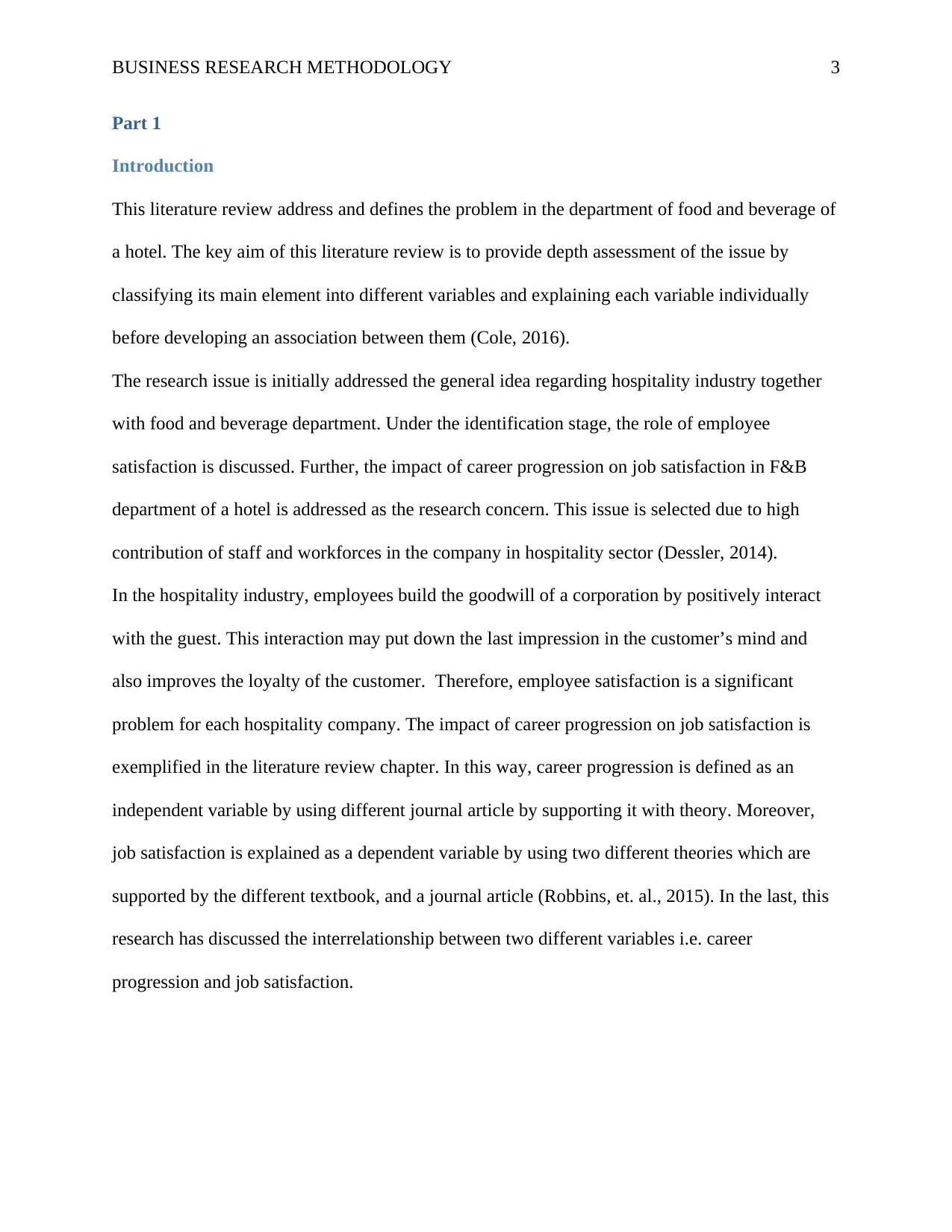
BUSINESS RESEARCH METHODOLOGY 3
Part 1
Introduction
This literature review address and defines the problem in the department of food and beverage of
a hotel. The key aim of this literature review is to provide depth assessment of the issue by
classifying its main element into different variables and explaining each variable individually
before developing an association between them (Cole, 2016).
The research issue is initially addressed the general idea regarding hospitality industry together
with food and beverage department. Under the identification stage, the role of employee
satisfaction is discussed. Further, the impact of career progression on job satisfaction in F&B
department of a hotel is addressed as the research concern. This issue is selected due to high
contribution of staff and workforces in the company in hospitality sector (Dessler, 2014).
In the hospitality industry, employees build the goodwill of a corporation by positively interact
with the guest. This interaction may put down the last impression in the customer’s mind and
also improves the loyalty of the customer. Therefore, employee satisfaction is a significant
problem for each hospitality company. The impact of career progression on job satisfaction is
exemplified in the literature review chapter. In this way, career progression is defined as an
independent variable by using different journal article by supporting it with theory. Moreover,
job satisfaction is explained as a dependent variable by using two different theories which are
supported by the different textbook, and a journal article (Robbins, et. al., 2015). In the last, this
research has discussed the interrelationship between two different variables i.e. career
progression and job satisfaction.
Part 1
Introduction
This literature review address and defines the problem in the department of food and beverage of
a hotel. The key aim of this literature review is to provide depth assessment of the issue by
classifying its main element into different variables and explaining each variable individually
before developing an association between them (Cole, 2016).
The research issue is initially addressed the general idea regarding hospitality industry together
with food and beverage department. Under the identification stage, the role of employee
satisfaction is discussed. Further, the impact of career progression on job satisfaction in F&B
department of a hotel is addressed as the research concern. This issue is selected due to high
contribution of staff and workforces in the company in hospitality sector (Dessler, 2014).
In the hospitality industry, employees build the goodwill of a corporation by positively interact
with the guest. This interaction may put down the last impression in the customer’s mind and
also improves the loyalty of the customer. Therefore, employee satisfaction is a significant
problem for each hospitality company. The impact of career progression on job satisfaction is
exemplified in the literature review chapter. In this way, career progression is defined as an
independent variable by using different journal article by supporting it with theory. Moreover,
job satisfaction is explained as a dependent variable by using two different theories which are
supported by the different textbook, and a journal article (Robbins, et. al., 2015). In the last, this
research has discussed the interrelationship between two different variables i.e. career
progression and job satisfaction.
⊘ This is a preview!⊘
Do you want full access?
Subscribe today to unlock all pages.

Trusted by 1+ million students worldwide
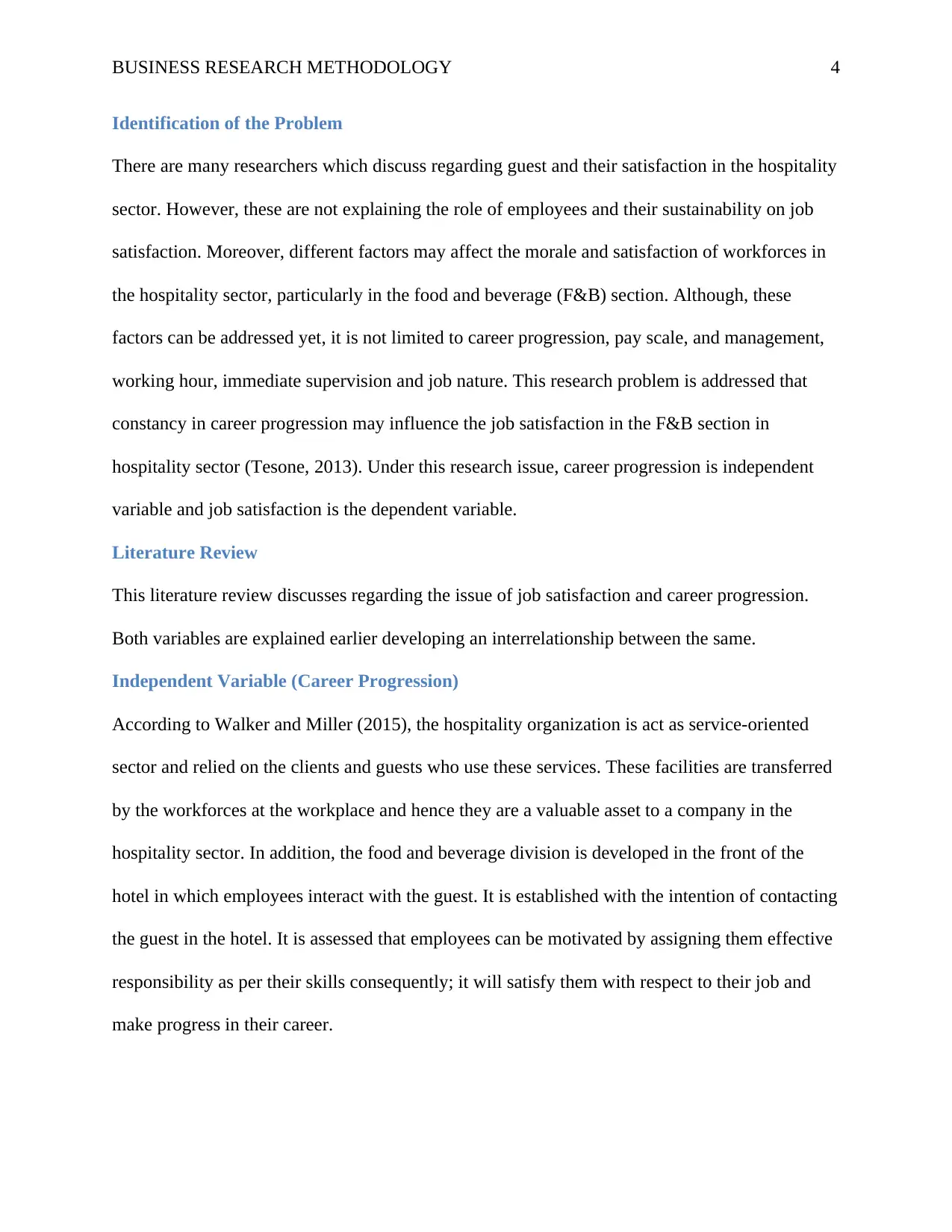
BUSINESS RESEARCH METHODOLOGY 4
Identification of the Problem
There are many researchers which discuss regarding guest and their satisfaction in the hospitality
sector. However, these are not explaining the role of employees and their sustainability on job
satisfaction. Moreover, different factors may affect the morale and satisfaction of workforces in
the hospitality sector, particularly in the food and beverage (F&B) section. Although, these
factors can be addressed yet, it is not limited to career progression, pay scale, and management,
working hour, immediate supervision and job nature. This research problem is addressed that
constancy in career progression may influence the job satisfaction in the F&B section in
hospitality sector (Tesone, 2013). Under this research issue, career progression is independent
variable and job satisfaction is the dependent variable.
Literature Review
This literature review discusses regarding the issue of job satisfaction and career progression.
Both variables are explained earlier developing an interrelationship between the same.
Independent Variable (Career Progression)
According to Walker and Miller (2015), the hospitality organization is act as service-oriented
sector and relied on the clients and guests who use these services. These facilities are transferred
by the workforces at the workplace and hence they are a valuable asset to a company in the
hospitality sector. In addition, the food and beverage division is developed in the front of the
hotel in which employees interact with the guest. It is established with the intention of contacting
the guest in the hotel. It is assessed that employees can be motivated by assigning them effective
responsibility as per their skills consequently; it will satisfy them with respect to their job and
make progress in their career.
Identification of the Problem
There are many researchers which discuss regarding guest and their satisfaction in the hospitality
sector. However, these are not explaining the role of employees and their sustainability on job
satisfaction. Moreover, different factors may affect the morale and satisfaction of workforces in
the hospitality sector, particularly in the food and beverage (F&B) section. Although, these
factors can be addressed yet, it is not limited to career progression, pay scale, and management,
working hour, immediate supervision and job nature. This research problem is addressed that
constancy in career progression may influence the job satisfaction in the F&B section in
hospitality sector (Tesone, 2013). Under this research issue, career progression is independent
variable and job satisfaction is the dependent variable.
Literature Review
This literature review discusses regarding the issue of job satisfaction and career progression.
Both variables are explained earlier developing an interrelationship between the same.
Independent Variable (Career Progression)
According to Walker and Miller (2015), the hospitality organization is act as service-oriented
sector and relied on the clients and guests who use these services. These facilities are transferred
by the workforces at the workplace and hence they are a valuable asset to a company in the
hospitality sector. In addition, the food and beverage division is developed in the front of the
hotel in which employees interact with the guest. It is established with the intention of contacting
the guest in the hotel. It is assessed that employees can be motivated by assigning them effective
responsibility as per their skills consequently; it will satisfy them with respect to their job and
make progress in their career.
Paraphrase This Document
Need a fresh take? Get an instant paraphrase of this document with our AI Paraphraser
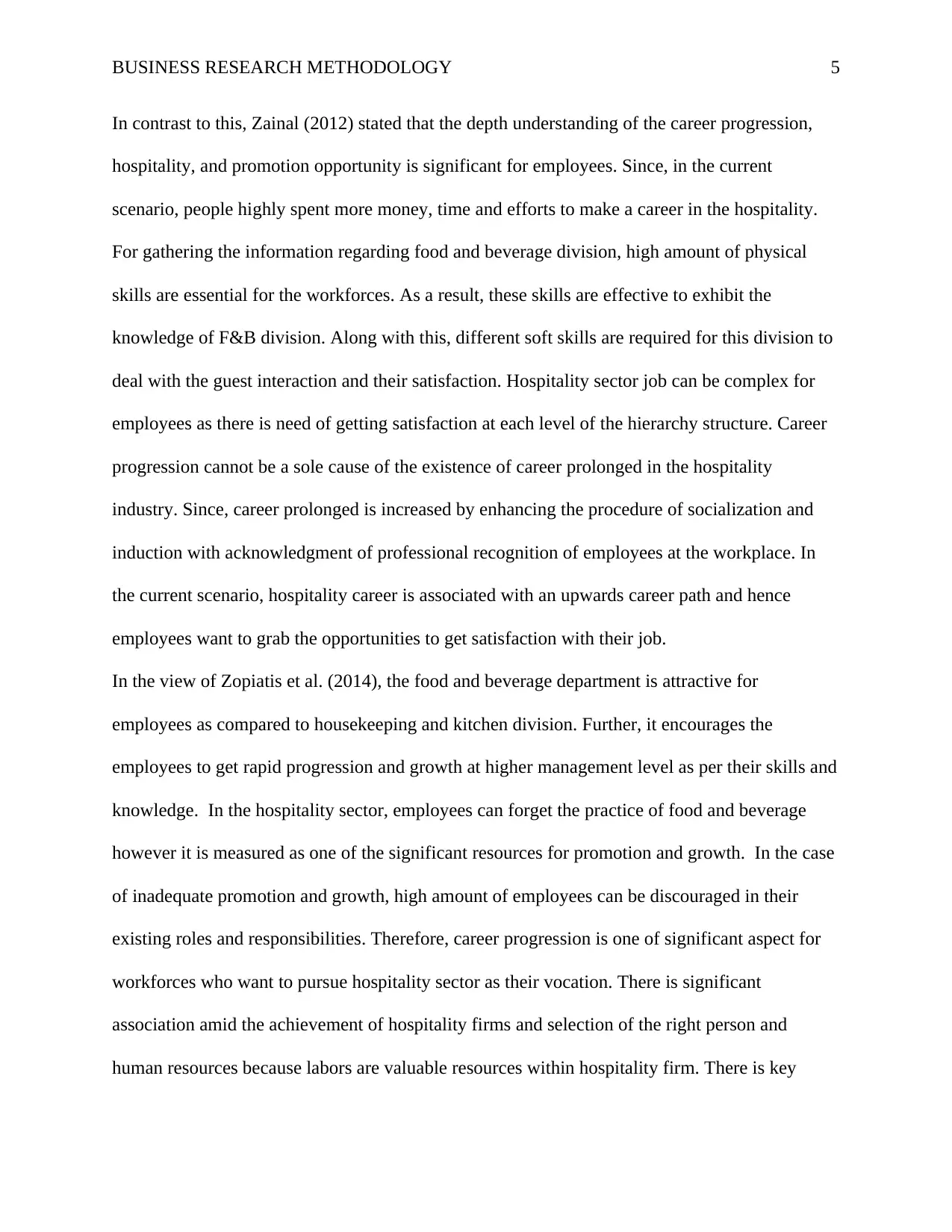
BUSINESS RESEARCH METHODOLOGY 5
In contrast to this, Zainal (2012) stated that the depth understanding of the career progression,
hospitality, and promotion opportunity is significant for employees. Since, in the current
scenario, people highly spent more money, time and efforts to make a career in the hospitality.
For gathering the information regarding food and beverage division, high amount of physical
skills are essential for the workforces. As a result, these skills are effective to exhibit the
knowledge of F&B division. Along with this, different soft skills are required for this division to
deal with the guest interaction and their satisfaction. Hospitality sector job can be complex for
employees as there is need of getting satisfaction at each level of the hierarchy structure. Career
progression cannot be a sole cause of the existence of career prolonged in the hospitality
industry. Since, career prolonged is increased by enhancing the procedure of socialization and
induction with acknowledgment of professional recognition of employees at the workplace. In
the current scenario, hospitality career is associated with an upwards career path and hence
employees want to grab the opportunities to get satisfaction with their job.
In the view of Zopiatis et al. (2014), the food and beverage department is attractive for
employees as compared to housekeeping and kitchen division. Further, it encourages the
employees to get rapid progression and growth at higher management level as per their skills and
knowledge. In the hospitality sector, employees can forget the practice of food and beverage
however it is measured as one of the significant resources for promotion and growth. In the case
of inadequate promotion and growth, high amount of employees can be discouraged in their
existing roles and responsibilities. Therefore, career progression is one of significant aspect for
workforces who want to pursue hospitality sector as their vocation. There is significant
association amid the achievement of hospitality firms and selection of the right person and
human resources because labors are valuable resources within hospitality firm. There is key
In contrast to this, Zainal (2012) stated that the depth understanding of the career progression,
hospitality, and promotion opportunity is significant for employees. Since, in the current
scenario, people highly spent more money, time and efforts to make a career in the hospitality.
For gathering the information regarding food and beverage division, high amount of physical
skills are essential for the workforces. As a result, these skills are effective to exhibit the
knowledge of F&B division. Along with this, different soft skills are required for this division to
deal with the guest interaction and their satisfaction. Hospitality sector job can be complex for
employees as there is need of getting satisfaction at each level of the hierarchy structure. Career
progression cannot be a sole cause of the existence of career prolonged in the hospitality
industry. Since, career prolonged is increased by enhancing the procedure of socialization and
induction with acknowledgment of professional recognition of employees at the workplace. In
the current scenario, hospitality career is associated with an upwards career path and hence
employees want to grab the opportunities to get satisfaction with their job.
In the view of Zopiatis et al. (2014), the food and beverage department is attractive for
employees as compared to housekeeping and kitchen division. Further, it encourages the
employees to get rapid progression and growth at higher management level as per their skills and
knowledge. In the hospitality sector, employees can forget the practice of food and beverage
however it is measured as one of the significant resources for promotion and growth. In the case
of inadequate promotion and growth, high amount of employees can be discouraged in their
existing roles and responsibilities. Therefore, career progression is one of significant aspect for
workforces who want to pursue hospitality sector as their vocation. There is significant
association amid the achievement of hospitality firms and selection of the right person and
human resources because labors are valuable resources within hospitality firm. There is key
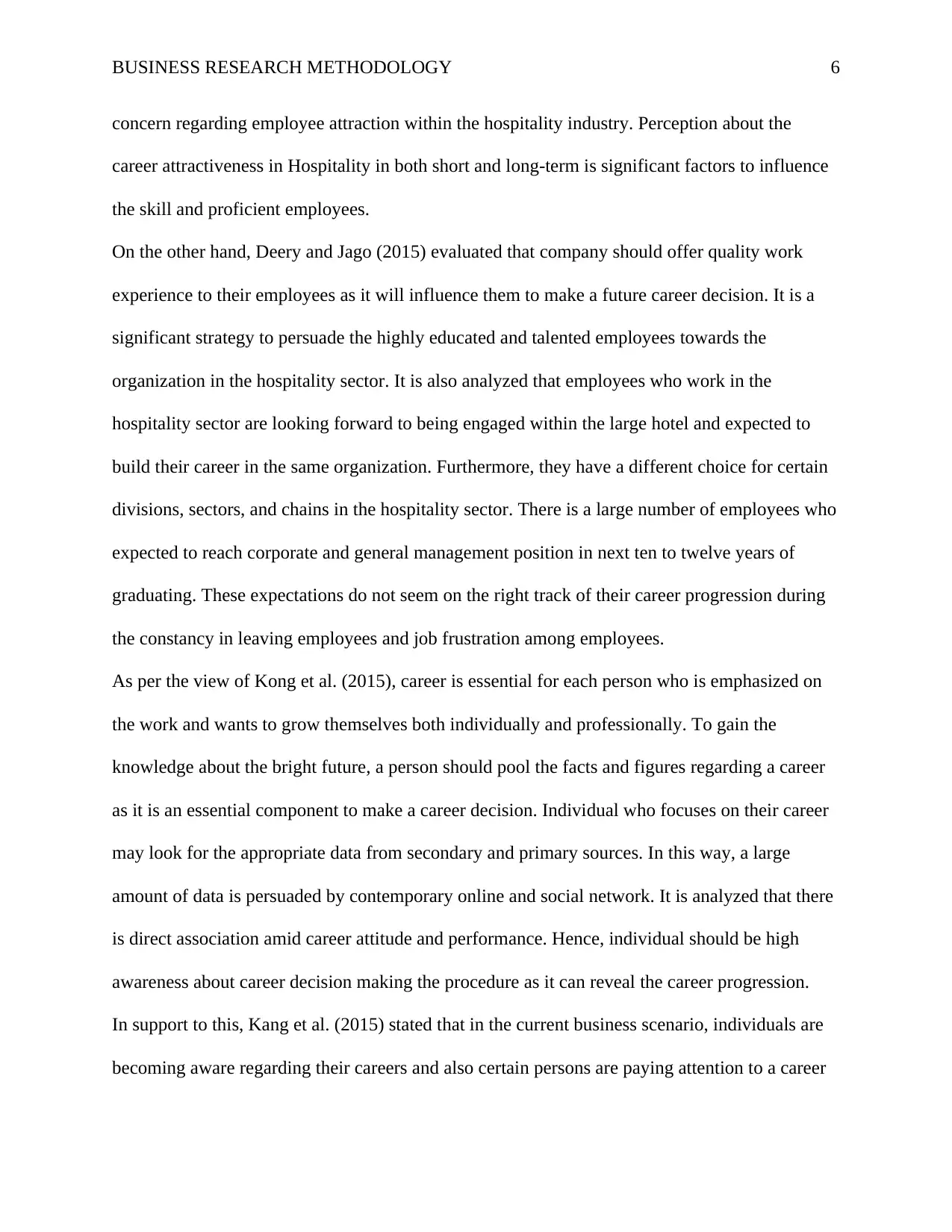
BUSINESS RESEARCH METHODOLOGY 6
concern regarding employee attraction within the hospitality industry. Perception about the
career attractiveness in Hospitality in both short and long-term is significant factors to influence
the skill and proficient employees.
On the other hand, Deery and Jago (2015) evaluated that company should offer quality work
experience to their employees as it will influence them to make a future career decision. It is a
significant strategy to persuade the highly educated and talented employees towards the
organization in the hospitality sector. It is also analyzed that employees who work in the
hospitality sector are looking forward to being engaged within the large hotel and expected to
build their career in the same organization. Furthermore, they have a different choice for certain
divisions, sectors, and chains in the hospitality sector. There is a large number of employees who
expected to reach corporate and general management position in next ten to twelve years of
graduating. These expectations do not seem on the right track of their career progression during
the constancy in leaving employees and job frustration among employees.
As per the view of Kong et al. (2015), career is essential for each person who is emphasized on
the work and wants to grow themselves both individually and professionally. To gain the
knowledge about the bright future, a person should pool the facts and figures regarding a career
as it is an essential component to make a career decision. Individual who focuses on their career
may look for the appropriate data from secondary and primary sources. In this way, a large
amount of data is persuaded by contemporary online and social network. It is analyzed that there
is direct association amid career attitude and performance. Hence, individual should be high
awareness about career decision making the procedure as it can reveal the career progression.
In support to this, Kang et al. (2015) stated that in the current business scenario, individuals are
becoming aware regarding their careers and also certain persons are paying attention to a career
concern regarding employee attraction within the hospitality industry. Perception about the
career attractiveness in Hospitality in both short and long-term is significant factors to influence
the skill and proficient employees.
On the other hand, Deery and Jago (2015) evaluated that company should offer quality work
experience to their employees as it will influence them to make a future career decision. It is a
significant strategy to persuade the highly educated and talented employees towards the
organization in the hospitality sector. It is also analyzed that employees who work in the
hospitality sector are looking forward to being engaged within the large hotel and expected to
build their career in the same organization. Furthermore, they have a different choice for certain
divisions, sectors, and chains in the hospitality sector. There is a large number of employees who
expected to reach corporate and general management position in next ten to twelve years of
graduating. These expectations do not seem on the right track of their career progression during
the constancy in leaving employees and job frustration among employees.
As per the view of Kong et al. (2015), career is essential for each person who is emphasized on
the work and wants to grow themselves both individually and professionally. To gain the
knowledge about the bright future, a person should pool the facts and figures regarding a career
as it is an essential component to make a career decision. Individual who focuses on their career
may look for the appropriate data from secondary and primary sources. In this way, a large
amount of data is persuaded by contemporary online and social network. It is analyzed that there
is direct association amid career attitude and performance. Hence, individual should be high
awareness about career decision making the procedure as it can reveal the career progression.
In support to this, Kang et al. (2015) stated that in the current business scenario, individuals are
becoming aware regarding their careers and also certain persons are paying attention to a career
⊘ This is a preview!⊘
Do you want full access?
Subscribe today to unlock all pages.

Trusted by 1+ million students worldwide
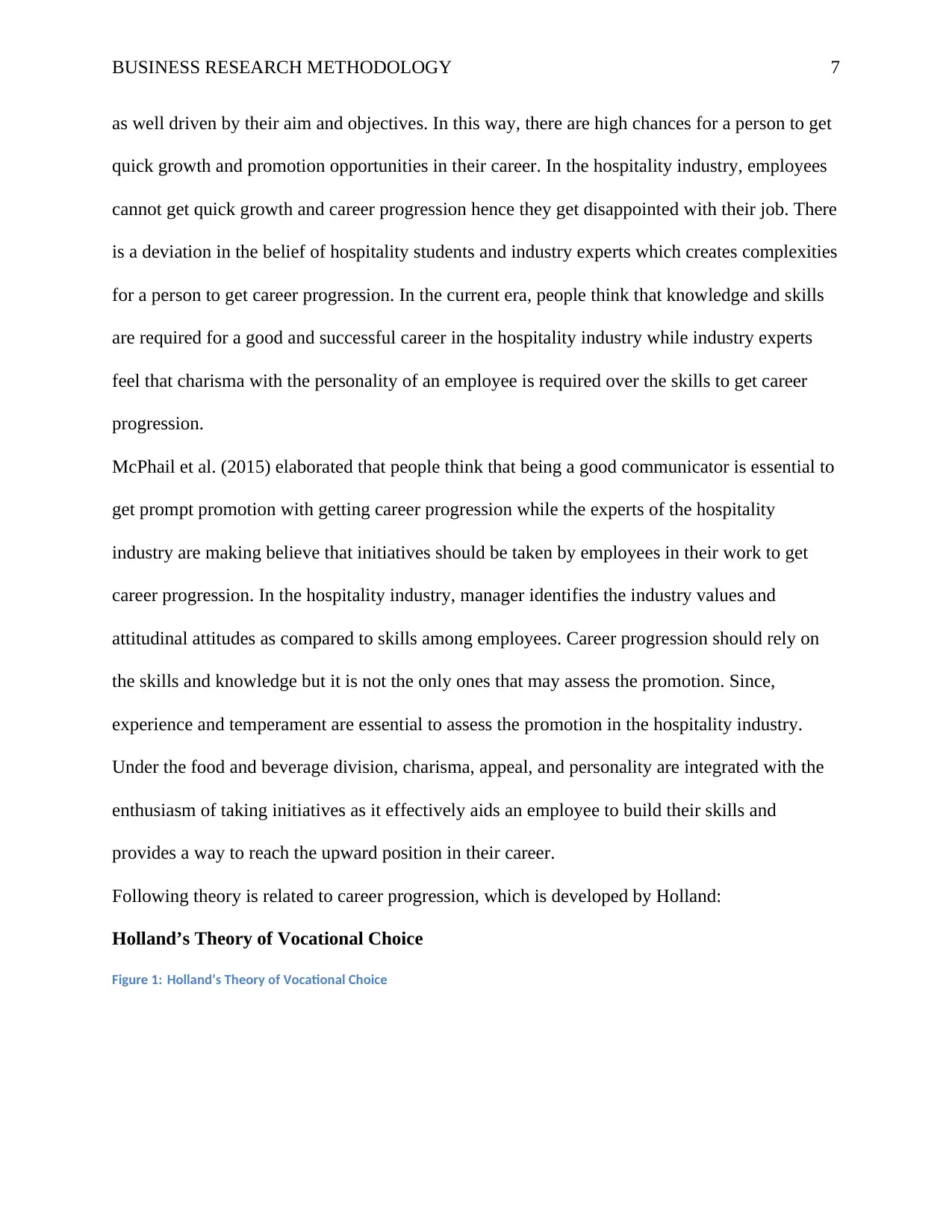
BUSINESS RESEARCH METHODOLOGY 7
as well driven by their aim and objectives. In this way, there are high chances for a person to get
quick growth and promotion opportunities in their career. In the hospitality industry, employees
cannot get quick growth and career progression hence they get disappointed with their job. There
is a deviation in the belief of hospitality students and industry experts which creates complexities
for a person to get career progression. In the current era, people think that knowledge and skills
are required for a good and successful career in the hospitality industry while industry experts
feel that charisma with the personality of an employee is required over the skills to get career
progression.
McPhail et al. (2015) elaborated that people think that being a good communicator is essential to
get prompt promotion with getting career progression while the experts of the hospitality
industry are making believe that initiatives should be taken by employees in their work to get
career progression. In the hospitality industry, manager identifies the industry values and
attitudinal attitudes as compared to skills among employees. Career progression should rely on
the skills and knowledge but it is not the only ones that may assess the promotion. Since,
experience and temperament are essential to assess the promotion in the hospitality industry.
Under the food and beverage division, charisma, appeal, and personality are integrated with the
enthusiasm of taking initiatives as it effectively aids an employee to build their skills and
provides a way to reach the upward position in their career.
Following theory is related to career progression, which is developed by Holland:
Holland’s Theory of Vocational Choice
Figure 1: Holland’s Theory of Vocational Choice
as well driven by their aim and objectives. In this way, there are high chances for a person to get
quick growth and promotion opportunities in their career. In the hospitality industry, employees
cannot get quick growth and career progression hence they get disappointed with their job. There
is a deviation in the belief of hospitality students and industry experts which creates complexities
for a person to get career progression. In the current era, people think that knowledge and skills
are required for a good and successful career in the hospitality industry while industry experts
feel that charisma with the personality of an employee is required over the skills to get career
progression.
McPhail et al. (2015) elaborated that people think that being a good communicator is essential to
get prompt promotion with getting career progression while the experts of the hospitality
industry are making believe that initiatives should be taken by employees in their work to get
career progression. In the hospitality industry, manager identifies the industry values and
attitudinal attitudes as compared to skills among employees. Career progression should rely on
the skills and knowledge but it is not the only ones that may assess the promotion. Since,
experience and temperament are essential to assess the promotion in the hospitality industry.
Under the food and beverage division, charisma, appeal, and personality are integrated with the
enthusiasm of taking initiatives as it effectively aids an employee to build their skills and
provides a way to reach the upward position in their career.
Following theory is related to career progression, which is developed by Holland:
Holland’s Theory of Vocational Choice
Figure 1: Holland’s Theory of Vocational Choice
Paraphrase This Document
Need a fresh take? Get an instant paraphrase of this document with our AI Paraphraser
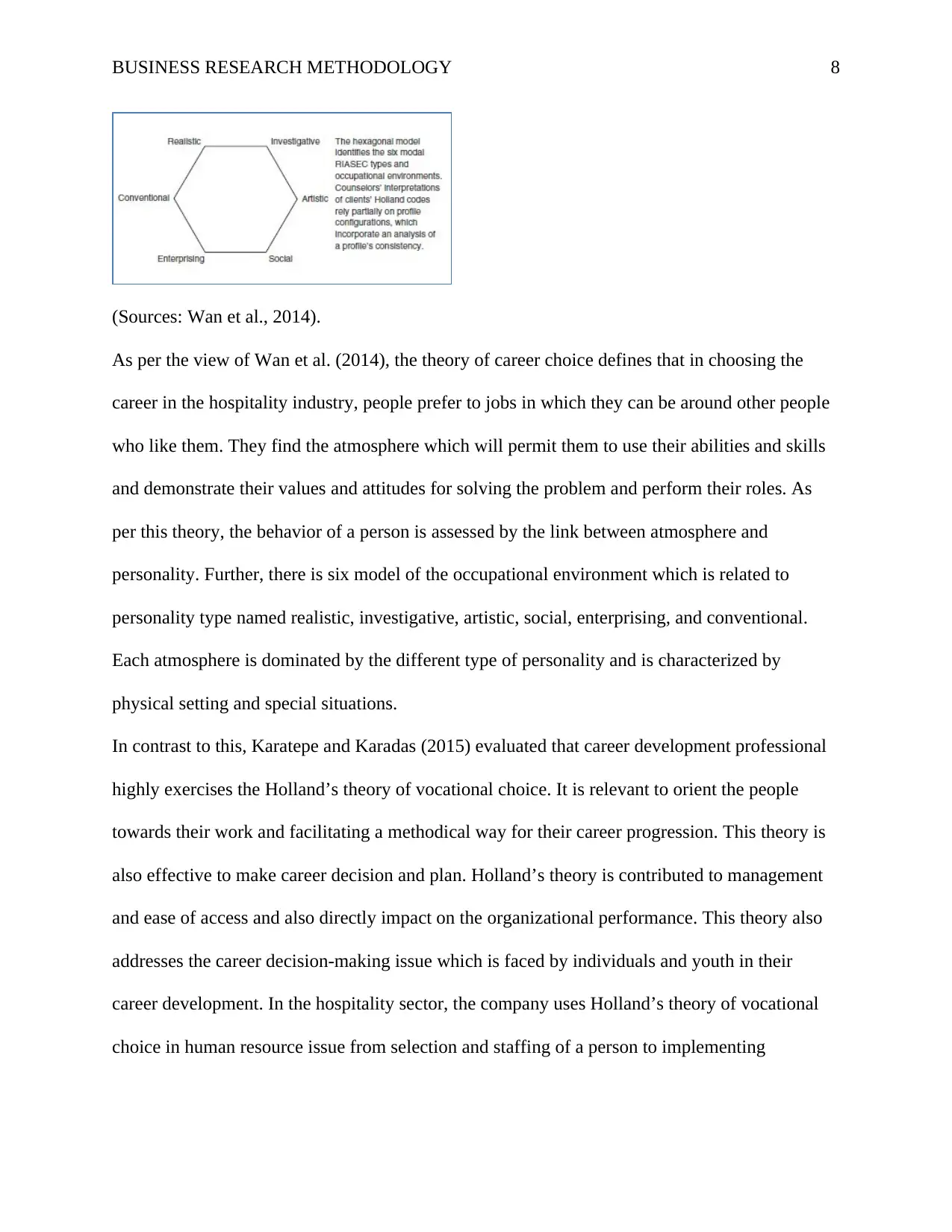
BUSINESS RESEARCH METHODOLOGY 8
(Sources: Wan et al., 2014).
As per the view of Wan et al. (2014), the theory of career choice defines that in choosing the
career in the hospitality industry, people prefer to jobs in which they can be around other people
who like them. They find the atmosphere which will permit them to use their abilities and skills
and demonstrate their values and attitudes for solving the problem and perform their roles. As
per this theory, the behavior of a person is assessed by the link between atmosphere and
personality. Further, there is six model of the occupational environment which is related to
personality type named realistic, investigative, artistic, social, enterprising, and conventional.
Each atmosphere is dominated by the different type of personality and is characterized by
physical setting and special situations.
In contrast to this, Karatepe and Karadas (2015) evaluated that career development professional
highly exercises the Holland’s theory of vocational choice. It is relevant to orient the people
towards their work and facilitating a methodical way for their career progression. This theory is
also effective to make career decision and plan. Holland’s theory is contributed to management
and ease of access and also directly impact on the organizational performance. This theory also
addresses the career decision-making issue which is faced by individuals and youth in their
career development. In the hospitality sector, the company uses Holland’s theory of vocational
choice in human resource issue from selection and staffing of a person to implementing
(Sources: Wan et al., 2014).
As per the view of Wan et al. (2014), the theory of career choice defines that in choosing the
career in the hospitality industry, people prefer to jobs in which they can be around other people
who like them. They find the atmosphere which will permit them to use their abilities and skills
and demonstrate their values and attitudes for solving the problem and perform their roles. As
per this theory, the behavior of a person is assessed by the link between atmosphere and
personality. Further, there is six model of the occupational environment which is related to
personality type named realistic, investigative, artistic, social, enterprising, and conventional.
Each atmosphere is dominated by the different type of personality and is characterized by
physical setting and special situations.
In contrast to this, Karatepe and Karadas (2015) evaluated that career development professional
highly exercises the Holland’s theory of vocational choice. It is relevant to orient the people
towards their work and facilitating a methodical way for their career progression. This theory is
also effective to make career decision and plan. Holland’s theory is contributed to management
and ease of access and also directly impact on the organizational performance. This theory also
addresses the career decision-making issue which is faced by individuals and youth in their
career development. In the hospitality sector, the company uses Holland’s theory of vocational
choice in human resource issue from selection and staffing of a person to implementing
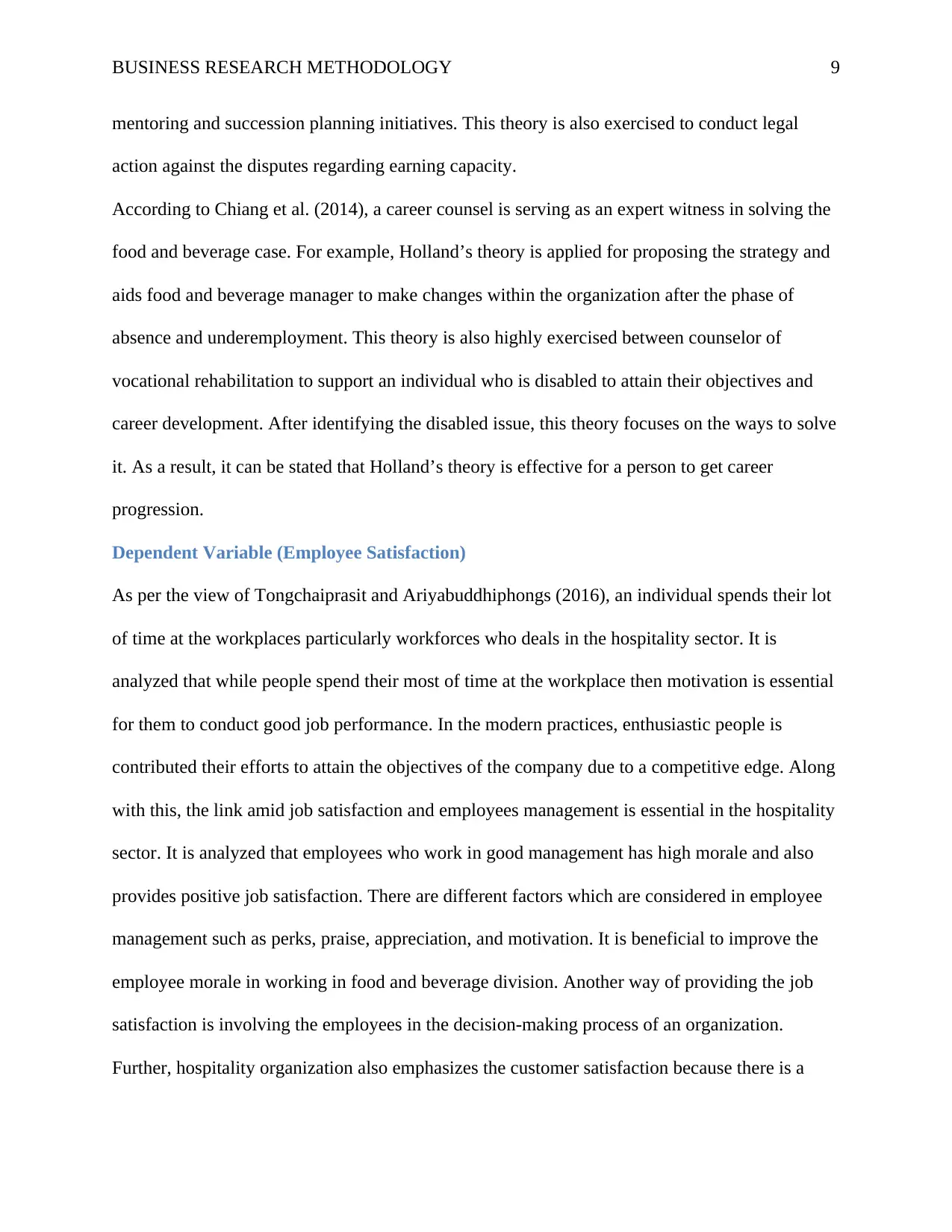
BUSINESS RESEARCH METHODOLOGY 9
mentoring and succession planning initiatives. This theory is also exercised to conduct legal
action against the disputes regarding earning capacity.
According to Chiang et al. (2014), a career counsel is serving as an expert witness in solving the
food and beverage case. For example, Holland’s theory is applied for proposing the strategy and
aids food and beverage manager to make changes within the organization after the phase of
absence and underemployment. This theory is also highly exercised between counselor of
vocational rehabilitation to support an individual who is disabled to attain their objectives and
career development. After identifying the disabled issue, this theory focuses on the ways to solve
it. As a result, it can be stated that Holland’s theory is effective for a person to get career
progression.
Dependent Variable (Employee Satisfaction)
As per the view of Tongchaiprasit and Ariyabuddhiphongs (2016), an individual spends their lot
of time at the workplaces particularly workforces who deals in the hospitality sector. It is
analyzed that while people spend their most of time at the workplace then motivation is essential
for them to conduct good job performance. In the modern practices, enthusiastic people is
contributed their efforts to attain the objectives of the company due to a competitive edge. Along
with this, the link amid job satisfaction and employees management is essential in the hospitality
sector. It is analyzed that employees who work in good management has high morale and also
provides positive job satisfaction. There are different factors which are considered in employee
management such as perks, praise, appreciation, and motivation. It is beneficial to improve the
employee morale in working in food and beverage division. Another way of providing the job
satisfaction is involving the employees in the decision-making process of an organization.
Further, hospitality organization also emphasizes the customer satisfaction because there is a
mentoring and succession planning initiatives. This theory is also exercised to conduct legal
action against the disputes regarding earning capacity.
According to Chiang et al. (2014), a career counsel is serving as an expert witness in solving the
food and beverage case. For example, Holland’s theory is applied for proposing the strategy and
aids food and beverage manager to make changes within the organization after the phase of
absence and underemployment. This theory is also highly exercised between counselor of
vocational rehabilitation to support an individual who is disabled to attain their objectives and
career development. After identifying the disabled issue, this theory focuses on the ways to solve
it. As a result, it can be stated that Holland’s theory is effective for a person to get career
progression.
Dependent Variable (Employee Satisfaction)
As per the view of Tongchaiprasit and Ariyabuddhiphongs (2016), an individual spends their lot
of time at the workplaces particularly workforces who deals in the hospitality sector. It is
analyzed that while people spend their most of time at the workplace then motivation is essential
for them to conduct good job performance. In the modern practices, enthusiastic people is
contributed their efforts to attain the objectives of the company due to a competitive edge. Along
with this, the link amid job satisfaction and employees management is essential in the hospitality
sector. It is analyzed that employees who work in good management has high morale and also
provides positive job satisfaction. There are different factors which are considered in employee
management such as perks, praise, appreciation, and motivation. It is beneficial to improve the
employee morale in working in food and beverage division. Another way of providing the job
satisfaction is involving the employees in the decision-making process of an organization.
Further, hospitality organization also emphasizes the customer satisfaction because there is a
⊘ This is a preview!⊘
Do you want full access?
Subscribe today to unlock all pages.

Trusted by 1+ million students worldwide
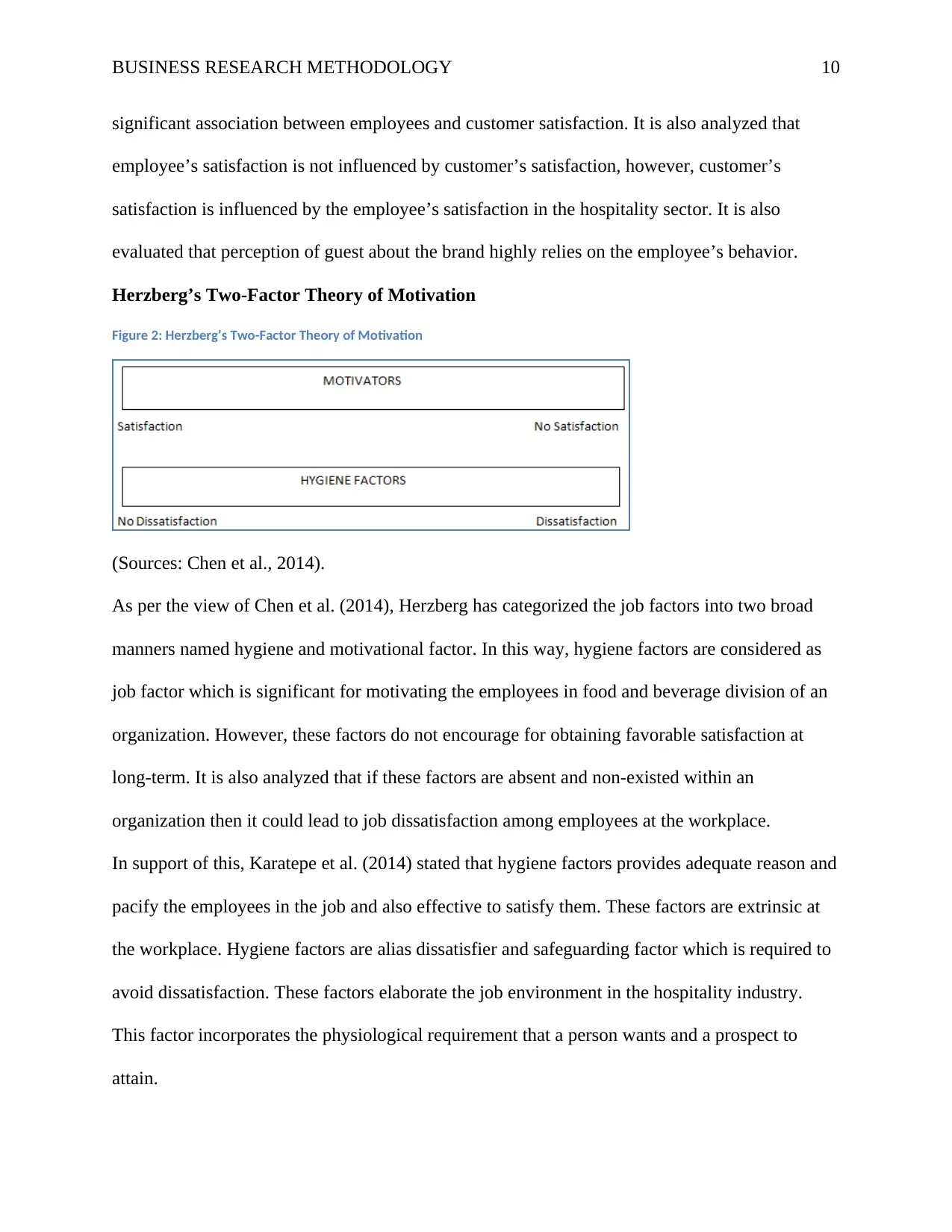
BUSINESS RESEARCH METHODOLOGY 10
significant association between employees and customer satisfaction. It is also analyzed that
employee’s satisfaction is not influenced by customer’s satisfaction, however, customer’s
satisfaction is influenced by the employee’s satisfaction in the hospitality sector. It is also
evaluated that perception of guest about the brand highly relies on the employee’s behavior.
Herzberg’s Two-Factor Theory of Motivation
Figure 2: Herzberg’s Two-Factor Theory of Motivation
(Sources: Chen et al., 2014).
As per the view of Chen et al. (2014), Herzberg has categorized the job factors into two broad
manners named hygiene and motivational factor. In this way, hygiene factors are considered as
job factor which is significant for motivating the employees in food and beverage division of an
organization. However, these factors do not encourage for obtaining favorable satisfaction at
long-term. It is also analyzed that if these factors are absent and non-existed within an
organization then it could lead to job dissatisfaction among employees at the workplace.
In support of this, Karatepe et al. (2014) stated that hygiene factors provides adequate reason and
pacify the employees in the job and also effective to satisfy them. These factors are extrinsic at
the workplace. Hygiene factors are alias dissatisfier and safeguarding factor which is required to
avoid dissatisfaction. These factors elaborate the job environment in the hospitality industry.
This factor incorporates the physiological requirement that a person wants and a prospect to
attain.
significant association between employees and customer satisfaction. It is also analyzed that
employee’s satisfaction is not influenced by customer’s satisfaction, however, customer’s
satisfaction is influenced by the employee’s satisfaction in the hospitality sector. It is also
evaluated that perception of guest about the brand highly relies on the employee’s behavior.
Herzberg’s Two-Factor Theory of Motivation
Figure 2: Herzberg’s Two-Factor Theory of Motivation
(Sources: Chen et al., 2014).
As per the view of Chen et al. (2014), Herzberg has categorized the job factors into two broad
manners named hygiene and motivational factor. In this way, hygiene factors are considered as
job factor which is significant for motivating the employees in food and beverage division of an
organization. However, these factors do not encourage for obtaining favorable satisfaction at
long-term. It is also analyzed that if these factors are absent and non-existed within an
organization then it could lead to job dissatisfaction among employees at the workplace.
In support of this, Karatepe et al. (2014) stated that hygiene factors provides adequate reason and
pacify the employees in the job and also effective to satisfy them. These factors are extrinsic at
the workplace. Hygiene factors are alias dissatisfier and safeguarding factor which is required to
avoid dissatisfaction. These factors elaborate the job environment in the hospitality industry.
This factor incorporates the physiological requirement that a person wants and a prospect to
attain.
Paraphrase This Document
Need a fresh take? Get an instant paraphrase of this document with our AI Paraphraser
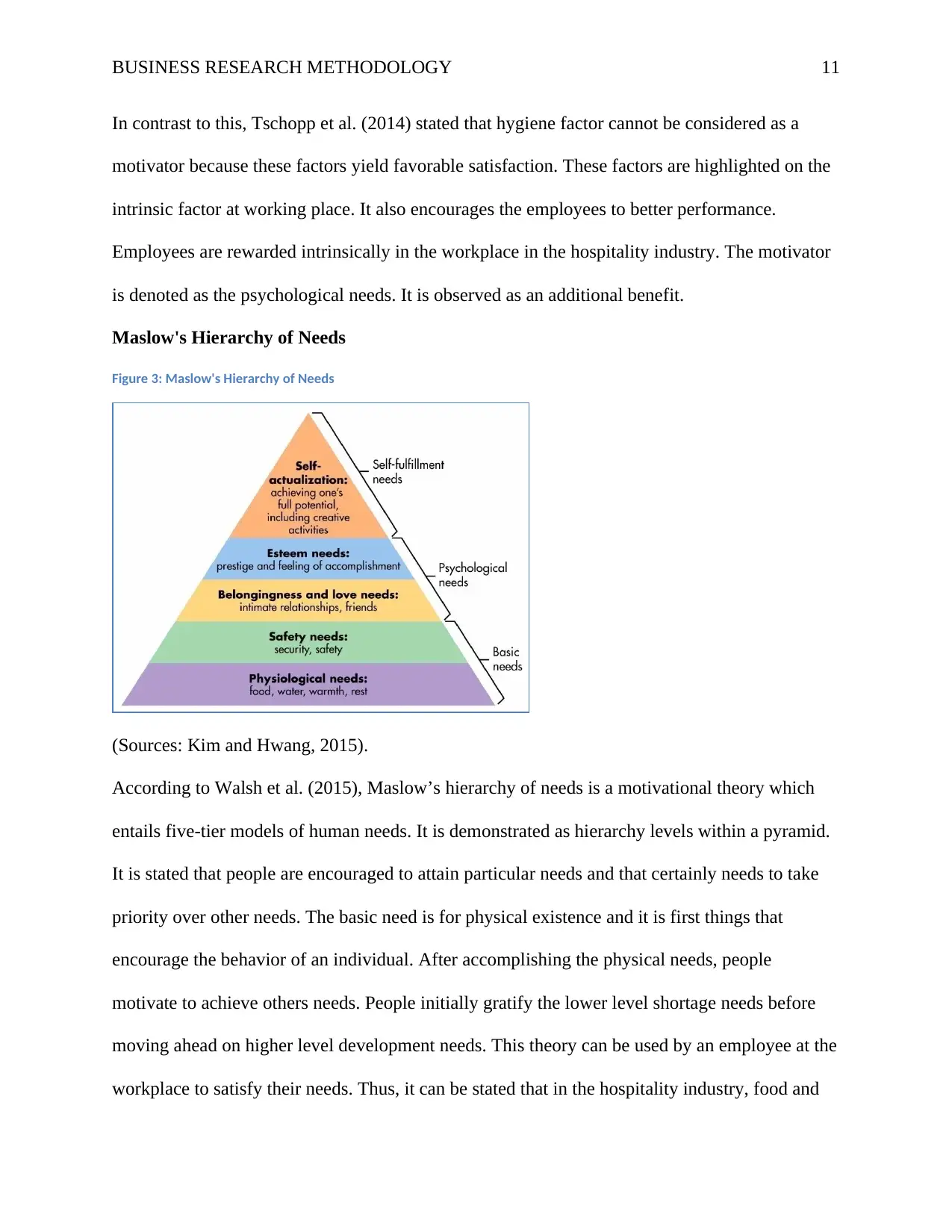
BUSINESS RESEARCH METHODOLOGY 11
In contrast to this, Tschopp et al. (2014) stated that hygiene factor cannot be considered as a
motivator because these factors yield favorable satisfaction. These factors are highlighted on the
intrinsic factor at working place. It also encourages the employees to better performance.
Employees are rewarded intrinsically in the workplace in the hospitality industry. The motivator
is denoted as the psychological needs. It is observed as an additional benefit.
Maslow's Hierarchy of Needs
Figure 3: Maslow's Hierarchy of Needs
(Sources: Kim and Hwang, 2015).
According to Walsh et al. (2015), Maslow’s hierarchy of needs is a motivational theory which
entails five-tier models of human needs. It is demonstrated as hierarchy levels within a pyramid.
It is stated that people are encouraged to attain particular needs and that certainly needs to take
priority over other needs. The basic need is for physical existence and it is first things that
encourage the behavior of an individual. After accomplishing the physical needs, people
motivate to achieve others needs. People initially gratify the lower level shortage needs before
moving ahead on higher level development needs. This theory can be used by an employee at the
workplace to satisfy their needs. Thus, it can be stated that in the hospitality industry, food and
In contrast to this, Tschopp et al. (2014) stated that hygiene factor cannot be considered as a
motivator because these factors yield favorable satisfaction. These factors are highlighted on the
intrinsic factor at working place. It also encourages the employees to better performance.
Employees are rewarded intrinsically in the workplace in the hospitality industry. The motivator
is denoted as the psychological needs. It is observed as an additional benefit.
Maslow's Hierarchy of Needs
Figure 3: Maslow's Hierarchy of Needs
(Sources: Kim and Hwang, 2015).
According to Walsh et al. (2015), Maslow’s hierarchy of needs is a motivational theory which
entails five-tier models of human needs. It is demonstrated as hierarchy levels within a pyramid.
It is stated that people are encouraged to attain particular needs and that certainly needs to take
priority over other needs. The basic need is for physical existence and it is first things that
encourage the behavior of an individual. After accomplishing the physical needs, people
motivate to achieve others needs. People initially gratify the lower level shortage needs before
moving ahead on higher level development needs. This theory can be used by an employee at the
workplace to satisfy their needs. Thus, it can be stated that in the hospitality industry, food and
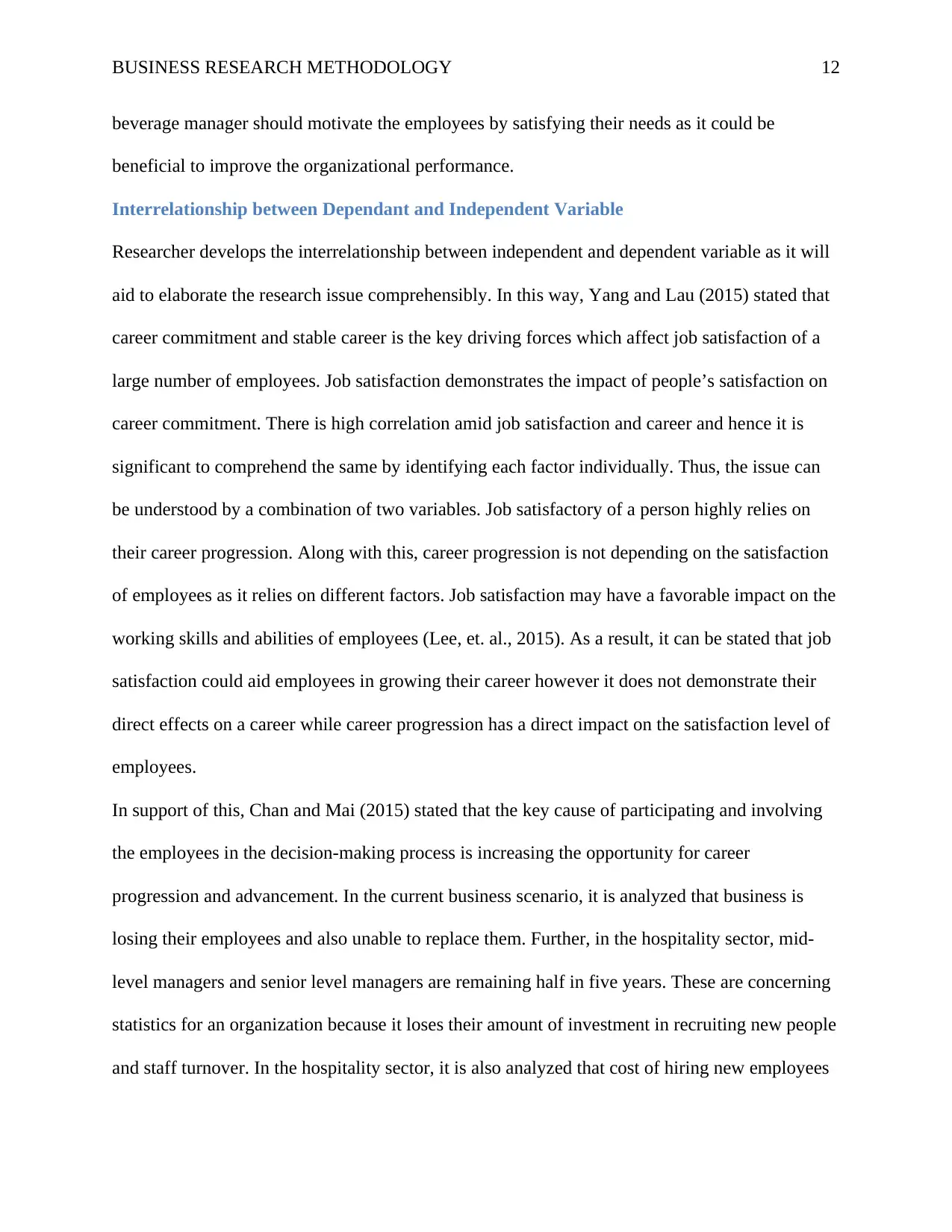
BUSINESS RESEARCH METHODOLOGY 12
beverage manager should motivate the employees by satisfying their needs as it could be
beneficial to improve the organizational performance.
Interrelationship between Dependant and Independent Variable
Researcher develops the interrelationship between independent and dependent variable as it will
aid to elaborate the research issue comprehensibly. In this way, Yang and Lau (2015) stated that
career commitment and stable career is the key driving forces which affect job satisfaction of a
large number of employees. Job satisfaction demonstrates the impact of people’s satisfaction on
career commitment. There is high correlation amid job satisfaction and career and hence it is
significant to comprehend the same by identifying each factor individually. Thus, the issue can
be understood by a combination of two variables. Job satisfactory of a person highly relies on
their career progression. Along with this, career progression is not depending on the satisfaction
of employees as it relies on different factors. Job satisfaction may have a favorable impact on the
working skills and abilities of employees (Lee, et. al., 2015). As a result, it can be stated that job
satisfaction could aid employees in growing their career however it does not demonstrate their
direct effects on a career while career progression has a direct impact on the satisfaction level of
employees.
In support of this, Chan and Mai (2015) stated that the key cause of participating and involving
the employees in the decision-making process is increasing the opportunity for career
progression and advancement. In the current business scenario, it is analyzed that business is
losing their employees and also unable to replace them. Further, in the hospitality sector, mid-
level managers and senior level managers are remaining half in five years. These are concerning
statistics for an organization because it loses their amount of investment in recruiting new people
and staff turnover. In the hospitality sector, it is also analyzed that cost of hiring new employees
beverage manager should motivate the employees by satisfying their needs as it could be
beneficial to improve the organizational performance.
Interrelationship between Dependant and Independent Variable
Researcher develops the interrelationship between independent and dependent variable as it will
aid to elaborate the research issue comprehensibly. In this way, Yang and Lau (2015) stated that
career commitment and stable career is the key driving forces which affect job satisfaction of a
large number of employees. Job satisfaction demonstrates the impact of people’s satisfaction on
career commitment. There is high correlation amid job satisfaction and career and hence it is
significant to comprehend the same by identifying each factor individually. Thus, the issue can
be understood by a combination of two variables. Job satisfactory of a person highly relies on
their career progression. Along with this, career progression is not depending on the satisfaction
of employees as it relies on different factors. Job satisfaction may have a favorable impact on the
working skills and abilities of employees (Lee, et. al., 2015). As a result, it can be stated that job
satisfaction could aid employees in growing their career however it does not demonstrate their
direct effects on a career while career progression has a direct impact on the satisfaction level of
employees.
In support of this, Chan and Mai (2015) stated that the key cause of participating and involving
the employees in the decision-making process is increasing the opportunity for career
progression and advancement. In the current business scenario, it is analyzed that business is
losing their employees and also unable to replace them. Further, in the hospitality sector, mid-
level managers and senior level managers are remaining half in five years. These are concerning
statistics for an organization because it loses their amount of investment in recruiting new people
and staff turnover. In the hospitality sector, it is also analyzed that cost of hiring new employees
⊘ This is a preview!⊘
Do you want full access?
Subscribe today to unlock all pages.

Trusted by 1+ million students worldwide
1 out of 24
Related Documents
Your All-in-One AI-Powered Toolkit for Academic Success.
+13062052269
info@desklib.com
Available 24*7 on WhatsApp / Email
![[object Object]](/_next/static/media/star-bottom.7253800d.svg)
Unlock your academic potential
Copyright © 2020–2026 A2Z Services. All Rights Reserved. Developed and managed by ZUCOL.





